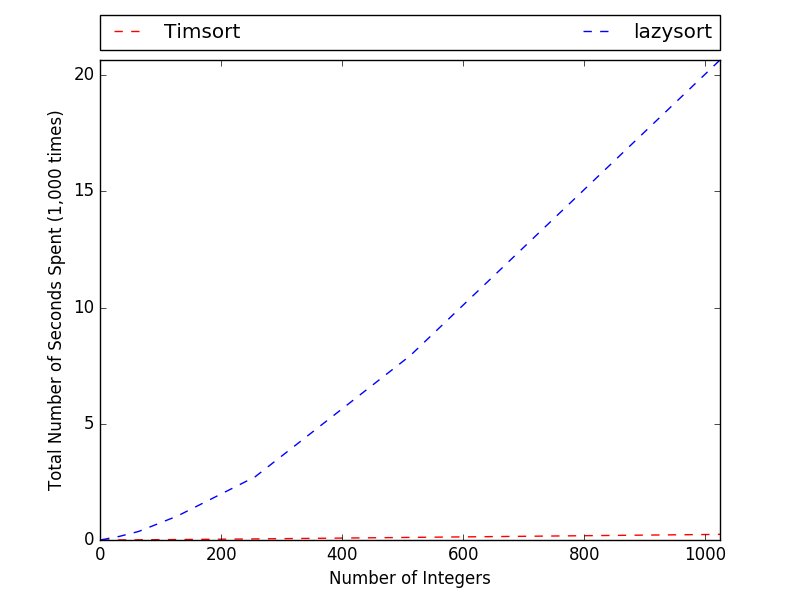In programming language theory, lazy evaluation, or call-by-need is an evaluation strategy which delays the evaluation of an expression until its value is needed (non-strict evaluation). https://en.wikipedia.org/wiki/Lazy_evaluation
lazysort is a sorting algorithm that procrastinates doing work as much as possible.
lazysort uses a modified version of dropsort, a "lossy" sorting algorithm, which keeps the "dropped" items in a separate list (called surplus).
lazysort starts by dropsorting the main list, which also yields a surplus list, which is also a list. The surplus
list is, then, treated as another main list and sorted again using the modified dropsort algorithm, which yields
another surplus list and the process is repeated until the last surplus list is empty. Afterwards, starting from the
last surplus list every surplus list is merged with its main list, the result might be another surplus list
which is to be merged with its main list. For merging,
heapq.merge(), which
"merges multiple sorted inputs into a single sorted output" by returning an iterator, is used.
A simplified (non-lazy) version of lazysort is shown below (the real version uses generators for truly lazy-evaluation):
import typing
def lazysort(l: list) -> list:
# Stage 1
stack = []
current_list = l
while current_list:
main, surplus = dropsort(current_list)
stack.append(main)
current_list = surplus
# Stage 2
while len(stack) >= 2:
stack.append(merge(stack.pop(), stack.pop()))
return list(stack.pop())
def dropsort(l: list) -> typing.Tuple[list, list]:
result = [l[0]]
surplus = []
for i in range(1, len(l)):
if l[i] >= result[-1]:
result.append(l[i])
else:
surplus.append(l[i])
return result, surplus
You can always have a look at the source code for the real implementation.
The benchmark is done under the following conditions:
- Python 3.5.2
- Matplotlib 1.5.3
- Windows 10.0.14393 Home Single Language x64 (Build 14393)
- Intel Core i5-4210U on Lenovo Z50-70
Sorting n integers in range [0, 255]

As can be seen from the results, lazysort do not scale.
This is free and unencumbered software released into the public domain.
Anyone is free to copy, modify, publish, use, compile, sell, or distribute this software, either in source code form or as a compiled binary, for any purpose, commercial or non-commercial, and by any means.
In jurisdictions that recognize copyright laws, the author or authors of this software dedicate any and all copyright interest in the software to the public domain. We make this dedication for the benefit of the public at large and to the detriment of our heirs and successors. We intend this dedication to be an overt act of relinquishment in perpetuity of all present and future rights to this software under copyright law.
THE SOFTWARE IS PROVIDED "AS IS", WITHOUT WARRANTY OF ANY KIND, EXPRESS OR IMPLIED, INCLUDING BUT NOT LIMITED TO THE WARRANTIES OF MERCHANTABILITY, FITNESS FOR A PARTICULAR PURPOSE AND NONINFRINGEMENT. IN NO EVENT SHALL THE AUTHORS BE LIABLE FOR ANY CLAIM, DAMAGES OR OTHER LIABILITY, WHETHER IN AN ACTION OF CONTRACT, TORT OR OTHERWISE, ARISING FROM, OUT OF OR IN CONNECTION WITH THE SOFTWARE OR THE USE OR OTHER DEALINGS IN THE SOFTWARE.
For more information, please refer to http://unlicense.org
Bora M. Alper <bora@boramalper.org>